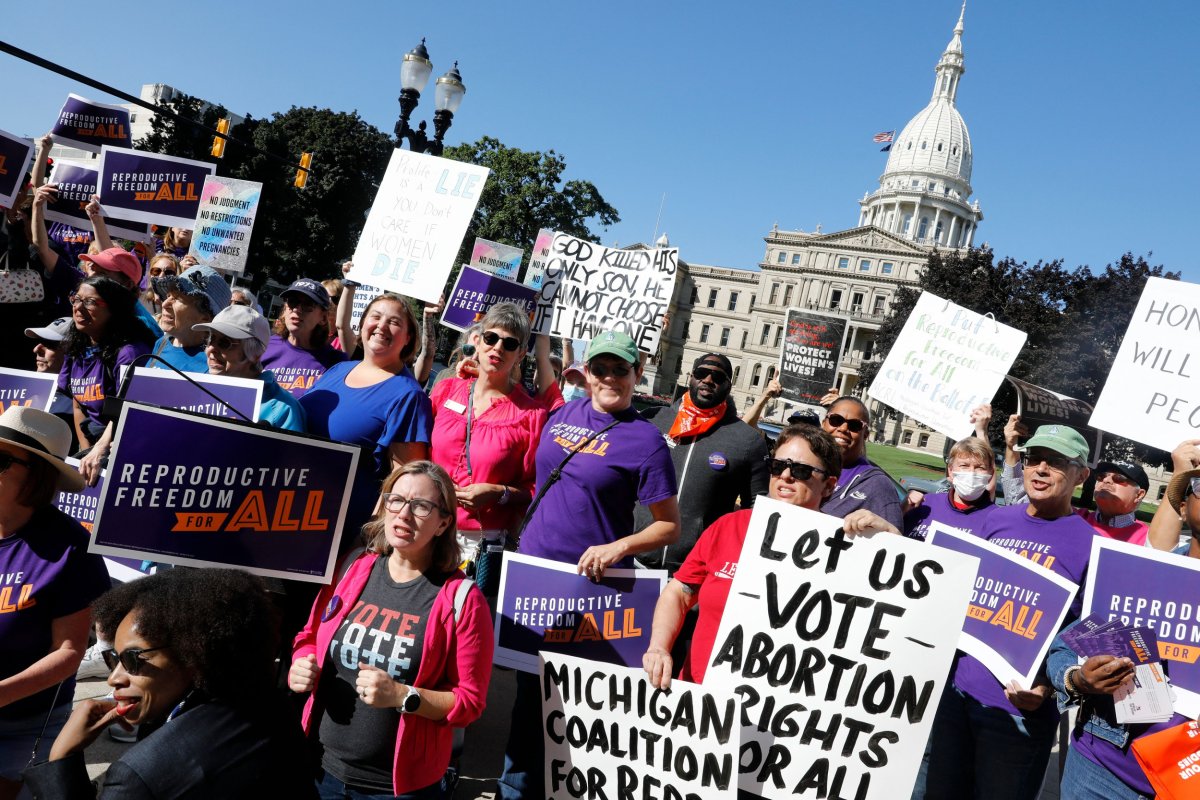Just over a year after the fall of Roe v. Wade, the anti-abortion movement is facing setbacks in multiple states.
Ohio voters on Tuesday resoundingly rejected a measure that would have made it harder for voters to amend the state constitution in November to guarantee abortion rights. Abortion rights activists cheered the defeat of Issue 1, which proposed requiring future changes to the state constitution to win the support of 60 percent of voters.
The result keeps in place a simple majority threshold to pass a ballot measure to establish "a fundamental right to reproductive freedom" in the state constitution. State officials said in July that proponents of that measure had submitted enough signatures for it to go on the November ballot.
Republican officials and anti-abortion activists across the country are working to make it harder to pass citizen-led ballot measures, as well as adding hurdles to the process of getting abortion on state ballots.

Recent polling found 58 percent of Ohioans support the proposed amendment—indicating that it would have been much more difficult to codify abortion rights in the state's constitution had Issue 1 passed.
Abortion rights advocates have celebrated a series of victories at the polls, including in conservative states, in the year since the U.S. Supreme Court's conservative majority overturned the landmark Roe decision.
Kansas, a conservative state with deep ties to the anti-abortion movement, was the first to put abortion on the ballot following the fall of Roe. There, voters resoundingly rejected a measure that would have allowed the Republican-controlled Legislature to tighten restrictions or ban abortion outright.
In the November midterms, voters rejected anti-abortion ballot measures in Kentucky and Montana.
In red Kentucky, they shot down a proposed amendment that would have stated the state constitution does not protect the right to an abortion, while in Montana, they rejected a measure that would have required medical care be given to "infants born alive after an induced labor, cesarean section, attempted abortion, or another method," Voters in battleground Michigan enshrined abortion rights in their state's constitution in November, as did voters in California and Vermont.
Meanwhile, efforts to put abortion on the ballot are moving forward in other states, including Arizona and Missouri.
"When it comes to actual popular politics, and especially direct votes on abortion, things are pretty bleak for the anti-abortion movement," said Mary Ziegler, a professor of law at UC Davis and the author of Dollars for Life: The Anti-Abortion Movement and the Fall of the Republican Establishment.
"It's a big warning for the anti-abortion movement, that American voters don't support these laws, even in conservative states."
Ziegler said anti-abortion groups are utilizing ways to advance their agenda that don't require voter support, such as seeking to ban the use of mifepristone, the pill used in more than half of U.S. abortions, through the courts.
"Unsurprisingly, the movement is doing a lot of litigation in front of conservative federal judges, I think believing that those judges are more likely to issue rulings that help the movement," she said.
Rachel Rebouché, a law professor at Temple University, told Newsweek: "I think ballot measures, and the results like we've seen in states, show the power of people's direct vote in determining abortion law at the state level.
"Ballot measures, perhaps in the short term, may provide one of the few ways to protect or to restore abortion access in red and purple states, where abortion is currently restricted, disentangling questions over banning abortion from political affiliation."
Ballot initiatives "appeal to direct democracy rest on the premise that people's votes will matter," Rebouché added.
"How much change ballot initiatives can make depend on how people's votes are counted. People in Ohio just made the decision to treat a ballot vote on abortion like all the ones that came before—they said no to changing the rules in hopes of changing November's outcome."
Susan B. Anthony Pro-Life America, a national group that opposes abortion rights, said the election outcome was "a sad day for Ohio and a warning for pro-life states across the nation."
"Sadly, attacks on state constitutions are now the national playbook of the extreme pro-abortion Left," the group said in a statement. "That is why everyone must take this threat seriously and recognize progressives will win if their opponents are scared into submission by the pro-abortion Left. So long as the Republicans and their supporters take the ostrich strategy and bury their heads in the sand, they will lose again and again."
Update 8/9/23, 10:40 a.m. ET: This article has been updated to add comment from Mary Ziegler.
Uncommon Knowledge
Newsweek is committed to challenging conventional wisdom and finding connections in the search for common ground.
Newsweek is committed to challenging conventional wisdom and finding connections in the search for common ground.
About the writer
Khaleda Rahman is Newsweek's Senior News Reporter based in London, UK. Her focus is reporting on abortion rights, race, education, ... Read more
To read how Newsweek uses AI as a newsroom tool, Click here.






